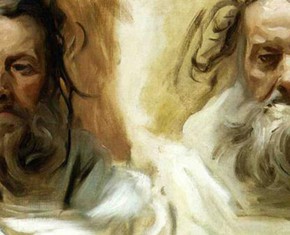The views expressed in our content reflect individual perspectives and do not represent the authoritative views of the Baha'i Faith.
Is there, of the sounds that float
Unsighingly, a single note
Half so sweet and clear and wild
As the laughter of a child? – Laman Blanchard
After the birth of Ishmael to Abraham and Hagar, several exciting things happen.
First, God reaffirms the existing covenant with Abraham, reminding him that his descendants will be made into a mighty nation. This matches and reaffirms the promise Hagar has received for Ishmael. Abraham, overwhelmed and grateful at the blessings in store for his son, prostrates himself in the dust. But, just as things seem settled, there is a surprise. God reveals that the nation to be born through Abraham’s heir, Ishmael, will not be the only nation founded by Abraham’s descendants.
What is more, Ishmael will no longer be Abraham’s only son. Ishmael will soon have a half-brother, because it is now Sarah’s turn to have a baby. Like Hagar, Sarah will receive blessings through her descendants because “she shall be a mother of nations; kings of peoples shall be of her.” – Genesis 17:16.
As a sign of His promise, God provides a new name for the messenger of god. His birth name of Abram becomes Abraham. At first glance, there seems hardly any difference between Abram and Abraham. But although both names have the connotation of exalted father, the slight change enlarges the meaning to reflect the terms of this new covenant. Abraham means “father of a multitude.”
Abraham’s wife also receives a new name. Sarai is renamed Sarah. In the view of many linguists, Sarai means noble or royal or even princess, in the sense that a father might call his daughter my little princess. An alternate explanation? Sarai comes from a root word that means quarrelsome or contentious, which is exactly how many Web sites dedicated to the process of naming a baby explain and define it.
Sarai’s new name, Sarah, is almost always explained as having the connotation of Princess with a capital P, though a few people hold out for the idea that it is taken from an Arabic root—saraa—and means having numerous progeny. In either case, the bestowal of a new name can be seen as a recognition of Sarah’s spiritual capacity as well as an indication of the lasting effect she will have on humanity. Four thousand years later, Sarah continues as a very popular name, and she is still referred to as a woman who “glorified the human race” by her excellences:
The one whose heart is purest, whose deeds are most perfect, is acceptable to God, male or female. Often in history women have been the pride of humanity — for example, Mary, the mother of Jesus. She was the glory of mankind. Mary Magdalene, Asiyih, daughter of Pharaoh, Sarah, wife of Abraham, and innumerable others have glorified the human race by their excellences. – Abdu’l-Baha, The Promulgation of Universal Peace, pp. 174-175.
In return for all these blessings, God announces a covenant: that succeeding generations must be faithful to Him; and that the land of Canaan will eventually be given to Abraham and his offspring. Because some translations of the verses in Genesis describing this covenant are puzzling, it can be useful to read at least two translations and compare them. Here is one in modern American English:
I will make a covenant with you, by which I will guarantee to make you into a mighty nation.” At this, Abram fell face down in the dust. Then god said to him, “This is my covenant with you. I will make you the father of not just one nation, but a multitude of nations! What’s more, I am changing your name. It will no longer be Abram; now you will be known as Abraham, for you will be the father of many nations. I will give you millions of descendants who will represent many nations. Kings will be among them!
I will continue the everlasting covenant between us, generation after generation. It will continue between me and your offspring forever. And I will always be your god and the god of your descendants after you. Yes, I will give all this land of Canaan to you and to your offspring forever. – Genesis 17:2-8, New Living Translation of the Bible
Here is another translation, in more formal British English:
And I will make my covenant between me and thee, and will multiply thee exceedingly. And Abram fell on his face: and god talked with him, saying, As for me, behold, my covenant is with thee, and thou shalt be a father of many nations. Neither shall thy name any more be called Abram, but thy name shall be Abraham; for a father of many nations have I made thee. And I will make thee exceeding fruitful, and I will make nations of thee, and kings shall come out of thee.
And I will establish my covenant between me and thee and thy seed after thee in their generations for an everlasting covenant, to be a god unto thee, and to thy seed after thee. And I will give unto thee, and to thy seed after thee, the land wherein thou art a stranger, all the land of Canaan, for an everlasting possession; and I will be their god. – Genesis 17:2-8, King James Version of the Bible
Abraham is described as laughing at the idea that he and Sarah can have a child this late in life. To emphasize their ages, Abraham is said to be ninety-nine and Sarah ten years younger. But, as usual, we don’t really know how old the two of them were in solar years, though a good guess would be middle-aged. Not too old for children by today’s standards, but quite old in a society where women were generally expected to bear at least one child before the age of twenty. God, amusingly, acknowledges the humor of the situation by directing Abraham to call the son Isaac, which means “he laughs.”
Next: Circumcision: Abraham’s Healthy Sacrifice
















Comments
Sign in or create an account
Continue with Googleor